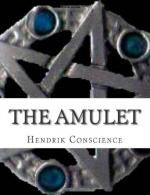“Make haste, Geronimo; Mary, prepare for a drive,” exclaimed Mr. Van de Werve, as he entered the hall. “Signor Deodati has arrived; the Il Salvatore is in sight. Don Pezoa has just sent me information to that effect, and he has placed his gondola and boatmen at our service. The weather is beautiful and calm; we will go to meet the Il Salvatore.”
Mary, as though forgetting in this unexpected news all that Geronimo had told her, ran joyfully and put on her hood before her duenna had time to approach her. Geronimo also looked happy, and prepared to meet his uncle without loss of time.
In a few minutes all was ready; the horses were harnessed to the carriage, the great gate was flung open, and the equipage was driven rapidly through the street.
CHAPTER II.
Signor Deodati.
On that day the Scheldt presented at Antwerp a striking spectacle. Many ships which had been detained in the North Sea by the east wind were approaching the city, with their various colored flags floating on the breeze, while, far as the eye could reach, the broad expanse of water was covered with sails, and still, in the dim horizon, mast after mast seemed to arise from the waves as harbingers of an immense flotilla.
The sailors displayed gigantic strength in casting anchor and manoeuvring their vessels so as to obtain an advantageous position. The crews of the different ships vied with each other, and exerted themselves so energetically that the heavily laden crafts trembled under the strained cables. From each arose a song wild and harsh as the sharp creaking of the capstan, but joyous as the triumphant shout of a victorious army. These chants, sung in every tongue of the commercial world by robust sailors, seemed, as they were wafted over the river to the city, like the long, loud acclamations of a vast multitude.
The only sounds which could be heard in the midst of these confused cries were the voices of the captains speaking through the trumpets; and when a Portuguese gallion, coming from the West Indies, appeared before the city, a salvo of cannon rose like the rolling of thunder above all other sounds.
The sun shone brightly upon this animated scene of human activity, and broke and sparkled in colored light up in the rippling waves of the broad river.
Hundreds of flags floated in the air; gondolas and longboats furrowed the waters; from boat and wharf joyous greetings of friends mingled with the song of the sailors. Even the wagoners from beyond the Rhine, who had ranged their strongly-built wagons near the cemetery of Burg, in order to load them with spices for Cologne, could not resist the influence of the beautiful May-day and the general hilarity; they collected near the gate of the dock-yard, and entoned in their German tongue a song so harmonious and sweet, and yet so manly, that every other sound in their vicinity was hushed.




